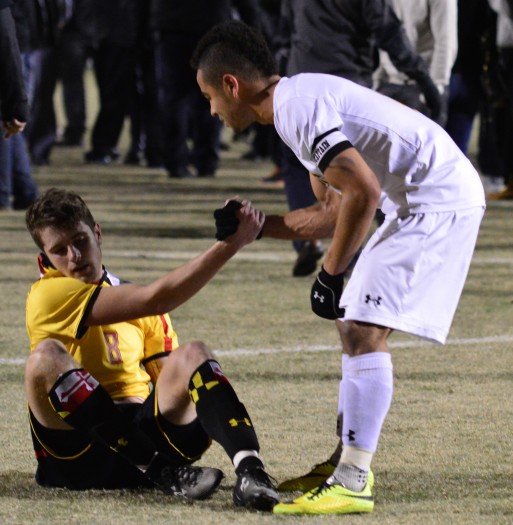Dougherty: Doing the right thing, even when it hurts
 The attacking player did well to get into the penalty area, the defender following closely behind but unable to do anything. A few steps inside the box, the attacker wound up to shoot and, inexplicably, tripped on his own plant foot, missing the ball entirely.
The attacking player did well to get into the penalty area, the defender following closely behind but unable to do anything. A few steps inside the box, the attacker wound up to shoot and, inexplicably, tripped on his own plant foot, missing the ball entirely.
That’s when things went south.
Perhaps he was shielded by a player and just assumed the attacking player was fouled. Or maybe he really thought he saw the defender trip the attacker – although video replays later clearly show the defender never touched him. Regardless, the referee blew the whistle and pointed to the spot. Penalty kick.
+READ: Dougherty: For the young player, details matter
Moments later, the goalkeeper was fishing the ball out of the net, the penalty-kick taker celebrating as if he had just scored the World Cup winner.
Did he do the right thing? I would argue, no.
“With integrity, you have nothing to fear since you have nothing to hide,” motivational speaker and social commentator Zig Ziglar once said. “With integrity, you will do the right thing, so you will have no guilt.”
Integrity. Character. Personal development. Youth coaches of every sport claim they teach these things to the kids they coach. And I suspect many of them do. But not all.
I remember hearing a debate once about whether sport develops character, or if it unveils character. Both sides made valid points, which left me with the conclusion it’s not an either-or. It’s both. Sport helps kids develop good character, and it displays the character a young player has already developed.
Having coached at every age group, I’ve seen firsthand how this works.
Generally, you don’t see many examples of poor character at the younger ages. For example, when the ball bounces out of bounds off a young player’s foot, it’s typical for a youngster to immediately back up and await the other team’s throw-in.
+READ: Poaching vs. Coaching: Can you tell the difference?
But at some point during the teenage years, something changes. I haven’t identified one specific age, because it varies by player or team. But when that ball bounces off a player’s foot and an opponent is near, suddenly it’s not so evident. He knows the throw-in belongs to the other team, but still the hand comes up as if to say, “Our ball!”
I’ve seen it time and time again. I want to say, “Dude, you know that went off of you. Why are you lying?”
 Well, he’s lying for two reasons. First, he wants to win the game, and getting possession for the throw-in might help his team do that. This might be particularly important if the ball went out of bounds near his own goal.
Well, he’s lying for two reasons. First, he wants to win the game, and getting possession for the throw-in might help his team do that. This might be particularly important if the ball went out of bounds near his own goal.
Second, there are no consequences to the lie. If he’s caught, the assistant referee might raise his flag with some added exuberance in a thinly-veiled effort to let the offending player know that his ploy was in vain. The center referee might shake his head and offer a “nice try, son” smile. And a few parents on the opposing team might raise a cry in protest.
But that’s it.
And if the lie works? We got possession. And we’re trying to win. What’s the big deal?
In that instance, sport didn’t develop character, it displayed it. The player had the opportunity to do the right thing, and didn’t. There was a bigger cause at work, namely winning the game.
Critics of this column will say, “Lighten up, Dougherty! It’s just a throw-in!”
But my mind wanders to that player 10 years from now, working for a law firm, a financial institution or a medical practice. He has learned that getting away with little misdeeds is how life works. Take, for instance, those who put together the shady mortgage products that led to the housing crisis a decade ago.
+READ: How the business of youth soccer changed the player-coach relationship
We look back on that now and can’t believe they were so malevolent. But were they? “What’s the big deal?” they may have asked. “It’s just a mortgage. Lighten up!”
I remember my own poor character moment. Freshman year in college, I made an overlapping run and, with a defender tracking me down, I attempted to cross the ball before it rolled over the endline. But I mis-hit the cross so poorly, the linesman – that’s what they were called back in the day – assumed the attempt was blocked by the defender. We were given a corner kick.
 I knew immediately I hit the ball out of bounds. But I didn’t say a word. We got the corner, I told myself. That’s all that matters. I suspect Machiavelli would have been pleased.
I knew immediately I hit the ball out of bounds. But I didn’t say a word. We got the corner, I told myself. That’s all that matters. I suspect Machiavelli would have been pleased.
To this day that play still bothers me. I could have turned to the linesman and said, “No, that was out on me. It’s a goal kick.” But I didn’t.
If you can’t be trusted with the little things, can you be trusted with big things? Using deception to get a small advantage in a youth soccer game is certainly a little thing. I argue, however, that letting that go sends a signal: Do what you need to do, just so we win.
The player who was awarded the penalty kick had every right to take the kick. But he didn’t have to score. His team benefited from the goal, but the opportunity to send a great message – do the right thing, even if it hurts – was, unfortunately, missed.
SOCCERWIRE MARKETPLACE
- Start the Season Strong at Loudoun Premier Cup!
- 50th Annual Rael Vodicka Memorial Tournament
- Soccer Marketing Internships at The St. James FC
- Job Opening: The St. James FC Goalkeeper Academy Coach
- Full-Time Director of Goalkeeping for The St. James FC
- visitRaleigh.com Showcase Series 2025, hosted by NCFC Youth
- Join Official Elite Summer Soccer Camps with Europe’s Top Pro Clubs!
- OFFICIAL BAYERN MUNICH SUMMER CAMPS U.S.
- OFFICIAL FC BARCELONA CAMPS U.S.
- The Cup San Diego - Hosted by Legends FC











